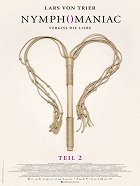Regie:
Lars von TrierDrehbuch:
Lars von TrierKamera:
Manuel Alberto ClaroBesetzung:
Charlotte Gainsbourg, Shia LaBeouf, Stellan Skarsgård, Stacy Martin, Willem Dafoe, Jamie Bell, Connie Nielsen, Mia Goth, Sophie Kennedy Clark (mehr)Streaming (3)
Inhalte(1)
Eine ganze Nacht lang reden Seligman (Stellan Skarsgård) und Joe (Charlotte Gainsbourg) miteinander. Joe erzählt dem Junggesellen, der sie mit in seine Wohnung genommen hat ihre Lebensgeschichte: Ihre erotischen Abenteuer und schonungslosen Experimente geraten zunehmend zu einem Zwang. Die Schilderung ihrer Suche nach Sex, nach Lust und nach Befriedigung ist für Seligman faszinierend, immer wieder versucht er, Erklärungen zu finden. Die Kapitel des zweiten Teils sind gefüllt mit Szenen und Assoziationen, mit spielerischen Verbindungen und überraschenden Themen: Zum Beispiel mit mehrstimmigen Orgel-Stücken und drei Männern, mit der Freude und dem Leiden in den Orthodoxen und der römischen Kirche, mit realen Körpern und ihren Spiegelungen, bis hin zu schmutzigen Geschäften und der sauberen Handhabung eine Pistole ... und mit starken Emotionen wie Lars von Trier sie perfekt in Szene zu setzen weiß: Eine Herausforderung und ein großes Kinoerlebnis... (Concorde Filmverleih)
(mehr)Kritiken (9)
Nymph()maniac 2 folgt in den ersten zwei Dritteln dem starken ersten Teil und mit dem sadistischen "Herrn K“ steigt er bei dem unbequemen Gefühl des Publikums bis in riskante Höhen. Aber das letzte, "kriminelle“ Drittel weckt den Verdacht, dass Lars entweder nicht wusste, wie er den Stoff adäquat und sinnvoll abschließen soll, oder sich von der Produktion überrennen ließ, die eine große Besucherzahl wollte (bei der Absenz von Shia LaBeouf in der Rolle von Jerome ahnt man, dass das letzte Drittel nachträglich aufgenommen wurde, als sein Vertrag abgelaufen ist; alle anderen Schauspieler*innen blieben in ihren Rollen). Die letzte Szene im Film ist ein schlechter Witz, eine Ohrfeige für das Publikum mit einem Handschuh voller Münzen, welche Nymph()maniac auch mit zwei Teilen verdient. Trier hat völlig (und völlig überflüssig) Skarsgårds Figur kaputtgemacht, die für die Geschichte wichtig ist.
()
I have seen and am reviewing only the director’s cut of both parts of Nymph()maniac. For five and a half hours, the narrative about various methods of physical (self-)satisfaction, which is unsatisfying for viewers, confronts the two greatest themes of all Freudian directors – sex and death. The most striking merger of the two occurs during a drastic miscarriage, at the end of which Joe trembles with arousal, and in the chapter with the dying father, whose black-and-white picture and tone of emotional blackmail give such a (pseudo)artistic impression that it is most likely one of von Trier’s many tactics aimed at depriving viewers of what they want. In the course of both films, he employs a disturbing number of diversions, notional parentheses, jumps in time and changes in the style of the narrative in order to evoke a feeling of unease that makes it impossible to unobtrusively construct a story. The film brings to mind Zanussi with its hypermedia-style encyclopaedic layering of information, Buñuel with its thematisation of fetishes and unstable identity, Bergman with the intimate exploration of relationships, and Tarkovsky with its spiritual excitement (including a direct quote from The Mirror). Though this eclectic and intermedia compilation of styles is held together by the framework narrative, I would not call it a coherent form. How could there be a coherent film that is constructed as a dialogue between two seemingly incompatible worldviews (asexual and nymphomaniac) into which von Trier constantly tries to draw the viewer, whether by shattering visual taboos (I have never seen a more graphic depiction of abortion in a film) or by breaking down the fourth wall between fiction and reality (the camera reflected in a mirror, obvious parallels between the provocatively free-thinking views of Joe and von Trier himself). Despite all of the sexual explicitness and the extreme suffering of the female protagonist, the treatment of the female body seemed less exploitative to me than in, for example, Blue Is the Warmest Colour. Even though the woman becomes a sexual object several times, especially in the first part, and through most of the film her happiness depends on the man’s stamina, availability and abilities, her depiction elicits pain, compassion and disgust more frequently than pleasant feelings. In this context, the most beneficial scene of the director's cut may be the aforementioned abortion, which, with an openness that I believe will be particularly unpleasant for men, demonstrates throughout both films the intensified forms of defending a woman’s right to decide what she does with her own body. Showing us what we do not want to see is closely connected with consideration of that which we do not want to think about. In my opinion, such a provocation makes sense, like Nymph()maniac as a whole. 75% for part I, 80% for part II.
()
My enthusiasm from the first Nymphomaniac can be summed up with the fact that I didn’t run to the cinema for the second part and waited for it without much interest for four months. And with similar lack of interest I spent two hours watching it, during which I looked at my watch more often that it would be healthy. There is something there, of course, Trier doesn’t make stupid empty stuff, and the climax is quite vibrant, but this time, the rules of his game didn’t work on me.
()
(Volume I)… which settles down a bit in the second half, when the forced overlaps disappear, and the director returns to his favorite theme of "woman as evil incarnate." This makes the film less long-winded but then comes Bond, 3+5, and golden rain, and the awkward impressions are broken even more than in Melancholia; please shrink the Director's Cut to two hours and without the asexual sex, though that's not really the point here (unexpectedly, right?).
()
The second part of Nymphomaniac starts as boring to give you a punch in the gut at the ending. Shia LaBeouf delivers an excellent performance, and Stellan Skarsgård’s acting remains solid. All the actors are without reproach, actually. We even see more of Charlotte Gainsbourg instead of her younger self played by Stacy Martin. Charlotte makes quite an impression with her nipples, which I’ll probably never forget. You don’t get to see nipples as pert as hers in movies much, if you see them at all. What is worse, however, is that Lars von Trier continued his episodic, meaningless narration, which is boring in places, interesting in others and way too philosophical in yet other moments. And this keeps going on until the moment when Stellan convinces you of something you would be better not knowing. After these almost four hours, the ending is a blow to a soul of every feeling viewer. I’m giving this film one star because Lars filmed it quite skillfully. It can’t be denied that he’s a good director, but all the rest in this film is pure suffering.
()
We left the comedy part behind us and now we get the sad part. So the viewer isn’t entertained, but he’s still curious. Of course, there’s a touch of S+M in the movie, but it’s an act of despair, not lust, and so the controversy somehow fades. The story of Fido’s life was certainly worth telling and I really liked that scene with the tree. The worst tasteless slap in the face of the whole story is the ending which more or less ruins the catharsis and doesn’t shock but revolts. It seems very forced. Or the loose ends with Jamie Bell and Willem Dafoe. Is it Lars’s work or the censor’s? Shame, maybe the director’s cut will make more sense. Hey Joe.
()
Nach fünfeinhalb Stunden, die ich mit den Wiederholungen beider Teile verbracht habe, zähle ich Nymph()maniac zu meinen Lieblingsfilmen. Das ist in der Tat ein sehr unterhaltsames Idyll. Die Abwechslung der Schauspieler in denselben Rollen erinnert mich an Buñuel, aber nicht nur in dieser Hinsicht begegnen sie sich gut mit von Trier. Die beiden schaffen sowieso nur, um sich über jeden und alles lustig zu machen, und das gefällt mir. Der ansonsten genrehaft wirkende zweite Teil hat mir anfangs nicht so gut gefallen, verglichen mit dem sehr freidenkerischen Anfang, aber die Regieversion lässt diese Negation völlig hinter sich. Es gibt bis zu einer Stunde neues Material zu sehen, und das bringt logischerweise eine neue Perspektive sowohl auf das Ganze als auch auf die zweite Hälfte dieser schwarzhumorigen Angelegenheit. Die scheinbar seltsamen Ideen und Botschaften der gekürzten Fassung erhalten ihre natürliche Argumentation und ihren logischen Platz in der Handlung. Ich schätze besonders die ganze Zeile über die Abtreibung, die die Figur Joe auf brillante Weise vervollständigt. Andererseits hatte ich mir mehr von dem neuen Fido-Kapitel erhofft, aber anscheinend wollte Lars auch dort nicht mehr hin. Schade.
()
The second Nymph()maniac romp is such a specific and unique product that I've decided to tolerate even the opinions of the writers of the "boo!" and below average reviews. Before I read the whiny compost of hypocritical declamations, of course. The menacing Director's Cunt is truly essential here, unlike in the first volume, and given its existence the abridged version need not be addressed at all. The uniqueness of the second, three-hour-long Nymph()maniac lies in the unique and almost constant transitions out of the medium, often related to the person of the director, which thus definitively underlines his egomania, but nonetheless opens the gateway to our perception of him through the means he controls (i.e., writing and directing), instead of those means (rhetoric) where he is more at a loss and constantly incurring considerable problems. The film thus comments not only on that famous Cannes Hitlerian empathy, accusations of misogyny, problems with censorship, or the expressive depiction of un-aestheticized nudity and violence. And it does so with a big fuck off in a similarly decently suggestive home-made abortion, subsequently likened to the slaughter of cattle, despite the fact that only a minute ago we could have been showering our love on a breathing aborted fetus. The director's role as a celebrity for senior actors suits Trier, which is why he can afford to deliberately and gleefully rip off scenes from his previous films, almost verbatim, in order to elicit audience reactions that rely on knowledge of the source instead of building the scene on its own merits (a child catching snow). Despite how terribly meta the whole thing is, it's fascinating how the individual sequences work when they're freed from a narrative superstructure for extended periods of time, and for example the whole SM passage with the absolutely bravura Jamie Bell is set in context so seamlessly and yet is so different that it actually underlines the whole idea of Trier's work, where there are no directorial mistakes, only audience ones.
()
Simply, the second half of the film, which by the way lasts two hours, is even more tedious and boring than the first part, and it has a strange ending, a strange overall culmination, which will leave you feeling like you missed something. I'm not particularly enthusiastic about this double film. It's not badly directed, but at the same time, it doesn't give the viewer much either. The pseudo controversies are sometimes apparent, but it's part of the film and the subject matter. It's just long and actually quite empty.
()

